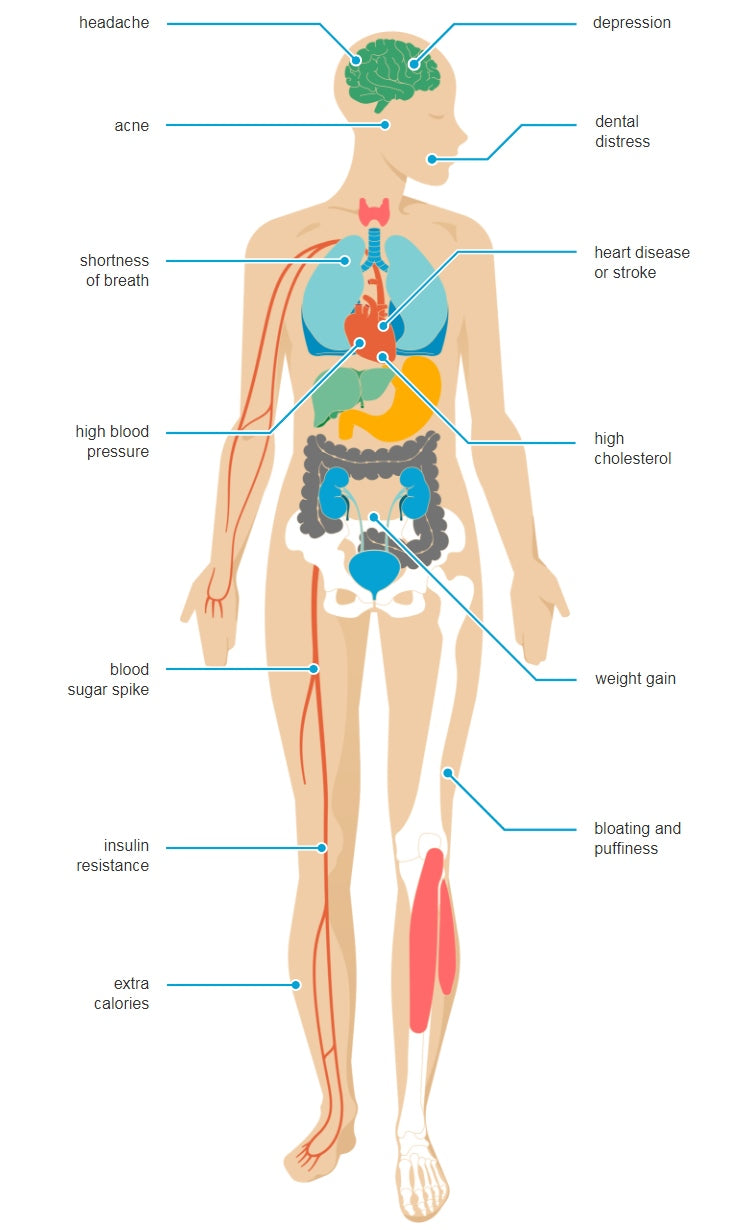The Effects of Fast Food on the Body

Eating out has become something of a hobby - and understandably so! Who can pass up an opportunity to let someone else take care of the cooking? This lifestyle is far more sociable and exciting than home cooked meals, not to mention the Instagram and Snapchat opportunities that come with it... #foodie!
Millennials are now the largest demographic group of all generations. According to Bank of America Merrill Lynch, millennials’ largest spend, above anything else, is at restaurants. This statistic doesn’t surprise me in the slightest and some could argue that this fuels the debate on why millennials are less likely to own their own home. Food for thought but we will leave that topic to another day. This same research evidences that whilst millennials concentrate more of their spending at restaurants, the other three age cohorts spend more at grocery stores.
Now, whilst it’s definitely nice to feel wined and dined, the reality is that most of the food we consume out-and-about isn’t actually nutritious at all. In fact, most of the time it’s convenient and spontaneous fixes that we crave on the go, aka fast food.
We are all familiar with snuffling down deliciously greasy food, only to feel instant regret and as though we have been punched in the stomach moments later. On occasion this won’t hurt, but developing a habit of it could be doing more damage to our health than the takeaway restaurants would have us believe.
The question is, how often can we get away with eating fast food/junk food? Could a few days of it, or even a single meal make a difference to our overall health?

Long-Term Effects
The long-term effects of eating junk food are what we tend to hear about most often. A high junk food diet is linked to a higher risk of obesity, depression, digestive issues, and more chronic illnesses such as heart disease, stroke and type 2 diabetes. The problem is, many people don’t take the long-term risks seriously, and think they have plenty of time before anything chronic can develop.
A review of studies on fast food and heart health found that having fast food more than once a week was linked to a higher risk of obesity, while eating fast food more than twice a week was associated with a higher risk of metabolic syndrome, type 2 diabetes and even fatality from coronary heart disease.
Frequency of consumption matters greatly when it comes to the impact fast food has on our health. This is quite alarming, considering that almost everyone I know eats fast food at least once per week. This generally happens for one or more of the following reasons; forgetting or can’t be bothered to pack lunch for work, binge eating after a night out on the town, being unaware of how many calories and saturated fats are in certain foods, excusing it because we balance it with fitness or simply just being unaware of what that one meal is doing to our insides.

Short-Term Effects
Studies show that even a few days of fast food could change your metabolism. Most fast food is full of carbohydrates, saturated fat and barely any fibre. These foods cause excessive stress on our metabolism, affecting the ability of our body to use insulin properly. Our bodies need insulin in order to use or store glucose for energy. Without insulin, glucose stays in the bloodstream, keeping blood sugar levels high. This results in weight gain and the chance of developing insulin resistance and eventually type 2 diabetes.
Even a single meal will have significant effects on your body. A single fast food meal can narrow your arteries leading to an increase in blood pressure. Many of these meals are also high in refined carbohydrates and added sugars which can cause a surge in insulin and a quick drop in blood sugar. This leaves you feeling tired, agitated and craving more.
Along with the risks I have already mentioned, the below diagram from Healthline further breaks down the impact that fast food has on our body.

Why Do We Do It?
In my opinion, it seems like many people are desensitised to the reality of it. This could be because they don’t care about eating healthy, are uneducated on the risks, or simply just can’t shake the habit.
Although I do feel that people are becoming increasingly conscious about avoiding fast-food chains such as McDonalds and KFC, we can also be a bit short-sighted when it comes to the cafes and restaurants that we frequent. We tend to give these restaurants the benefit of the doubt and assume that all meals are freshly prepared and therefore aren’t that bad for you. In reality though, we have no control over what they put into these meals and the food tends to be richer and higher in calories than the food you would eat at home. The simple and obvious reason for this is that they're trying to attract customers, designing the food to be full of flavour without much thought about our well-being. With this comes a higher percentage of fat, salt (sodium) and sugar. These ingredients are slower to digest and causes the body discomfort. An example of this is the “food baby”. You know that instant pregnant look you get after eating certain meals? Well that results from a diet that is high in sodium. A meal that is high in sodium causes water retention and gives you the feeling of being bloated, tender, and puffy.

Now What?
It doesn’t have to be all doom and gloom. The good news is, that every healthy meal counts. If you follow a healthy lifestyle most of the time, and live by the 90/10 rule I mention in the prevention over treatment blog, your body’s ability to cope with occasional fast food is much more effective than it would be if you were to lead an unhealthy lifestyle. The best way to do this is to think about your ratio of less healthy foods to healthy lifestyle. Do you exercise regularly? Do you smoke or overdo it on alcohol? Are you eating plenty of nutritious foods such as vegetables, fruit, legumes, fish, nuts and seeds and whole grains? If the ratio is unfavourable, perhaps consider if there is room for improvement?

Now that you are aware of some of the short and long-term impacts of fast food on the body, might you consider eating a little more mindfully the next time you eat out? Nourish your body with nutritious food 90% of the time to reduce stress and inflammation in the body. You will notice how much better your body performs throughout the day when you eat better sources of food. The purpose of food is to fuel us with energy. We can sometimes lose sight of this and fixate on the pleasure we get from the taste of fast food. However, the bigger picture is all about a healthy and balanced lifestyle. By all means, please still indulge in your favourite meals 10% of the time, but savour those moments and find your balance.







